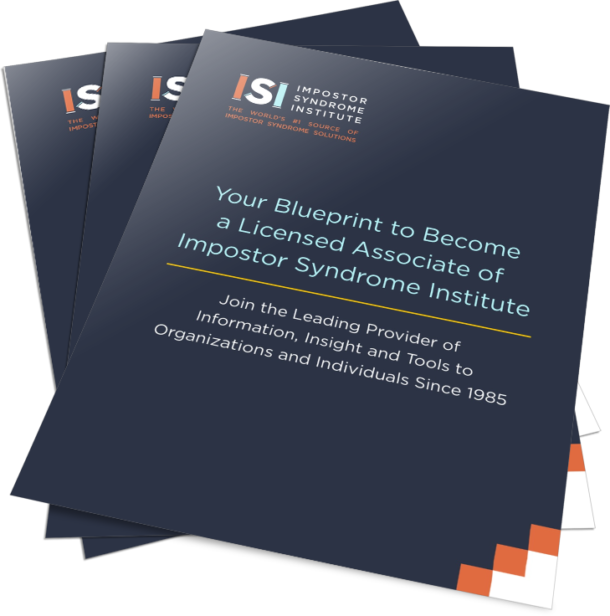But impostor syndrome can often be confused with low self-esteem, self-worth, lack of confidence — and a variety of other human experiences. So leading expert Dr. Valerie Young offers up these 10 ways to know if you suffer from impostor syndrome:
- You live in constant fear of being “found out.” To the outside world you appear confident and competent. Instead you believe that up until now anyway, you’ve somehow managed to slip through the system undetected and it is just a matter of time before you are found out.
- Each new challenge promises to be the “big one.” One reason you have succeeded is precisely because you have risen to meet new challenges. Yet, with each new challenge comes the fear of being “unmasked.” Each exam, presentation, interview, promotion, and so on is seen as the “big one,” the time where you will finally be unmasked as an impostor, fake and fraud. When that happens, you imagine catastrophic consequences. Not only will you be fired, but you’ll never find another job again.
- You believe your success is a fluke. Sure you’ve gotten good grades, awards, multiple degrees, a prestigious job… but you can explain all that. In fact, you’ve become quite adept at chalking your successes up to such external factors as luck, timing, charm, computer error, the supposed simplicity of the task (“If I can get a PhD from Harvard, anybody can”), or to other people’s efforts, pity or stupidity.
- You see mistake making and failure as synonymous. That’s because in the “impostor’s rulebook,” to make a mistake is to fail. And by your way of thinking, a truly competent person would never fail. Not only that, but if you stack all of your past mistakes and failures up on one side and all of your accomplishments and successes on the other, two things will happen. Not only is it far easier for you to recall every time you ever blew it – and in excruciatingly vivid detail at that – but because you’re using a trick scale, mistakes and failures are more heavily weighted and are what really “count.”
- When things go wrong, it’s your fault. One reason you weigh your limitations more heavily is that unlike your accomplishments, which you attribute to external factors, your mistakes and failures are internalized. While someone else might point to an impossible deadline, you fault your supposed lack of intelligence or skill. In addition to blaming yourself when things go wrong, mistakes and failures are personalized. As a result, the feedback that your work was inadequate becomes translated in your mind to mean: “I am inadequate.”
- You define competence as unaided perfection with ease. You are a perfectionist who has set impossibly high standards for yourself. Anything less than a perfect job is unacceptable and once again proves you are incompetent. You also believe that if you were really bright and capable, you would be able to do everything yourself. Therefore, asking for help just proves you are a phony. Any group effort, even a letter of recommendation, somehow detracts from your accomplishment.
- You’ve fallen into the “expert trap.” To be truly competent, you believe you must be an expert in your field. Your relentless pursuit of the title of “expert” leads you down a futile path to know everything there possibly is to know. Which means there’s always one more book to read, one more experiment to run, one more course to take, one more degree or certification to get before you can finally declare yourself an “expert.” and on and on.
- You use over working and over preparing to cover up your supposed ineptness. There’s nothing wrong with good old-fashioned hard work. But you persevere over even routine tasks as a way to protect yourself from being found out. You are driven by the belief that the only reason you got to where you are today is because you had to work harder and longer than everybody else. If you let up for even a minute, you fear the “jig” will be up. After all, you believe, if you were really intelligent you wouldn’t have to work so hard.
- Procrastination has become a way of life. Everyone procrastinates from time to time. But according to Pauline Clance and Suzanne Imes the two psychologists credited with first naming impostor feelings, for self-identified “impostors,” procrastination is often used to keep others from learning the “truth” of your ineptness. Like all coping and protecting mechanisms this one works – but at a price. If you wait until the very last minute to write an important paper or article and the results reflect your lack of time and effort, you have a built- in excuse. If however, the results are good, you feel like a phony because you know it did not reflect your true abilities.
- You fear success far more than failure. The thought of actually succeeding can be far more stressful than failing. After all, the higher up you go, the higher the stakes get as well. Expectations will be higher. More people will be counting on you. There is farther to fall. Because you find it so hard to fully lay claim to your past accomplishments, when you do reach the next level of success, it is emotionally unclear to you how you got there.
Get on the waitlist for our new Book Club where we’ll discuss Dr. Valerie Young’s book The Secret Thoughts of Successful Women And Men: Why Capable People Suffer from the Impostor Syndrome and How to Thrive in Spite of It. You’ll gain insight into impostor syndrome and get practical ways to banish the thought patterns that undermine your ability to feel — and act — as bright and capable as you truly are. Click here to get on the Book Club waitlist to get additional strategies for unlearning impostor syndrome.



